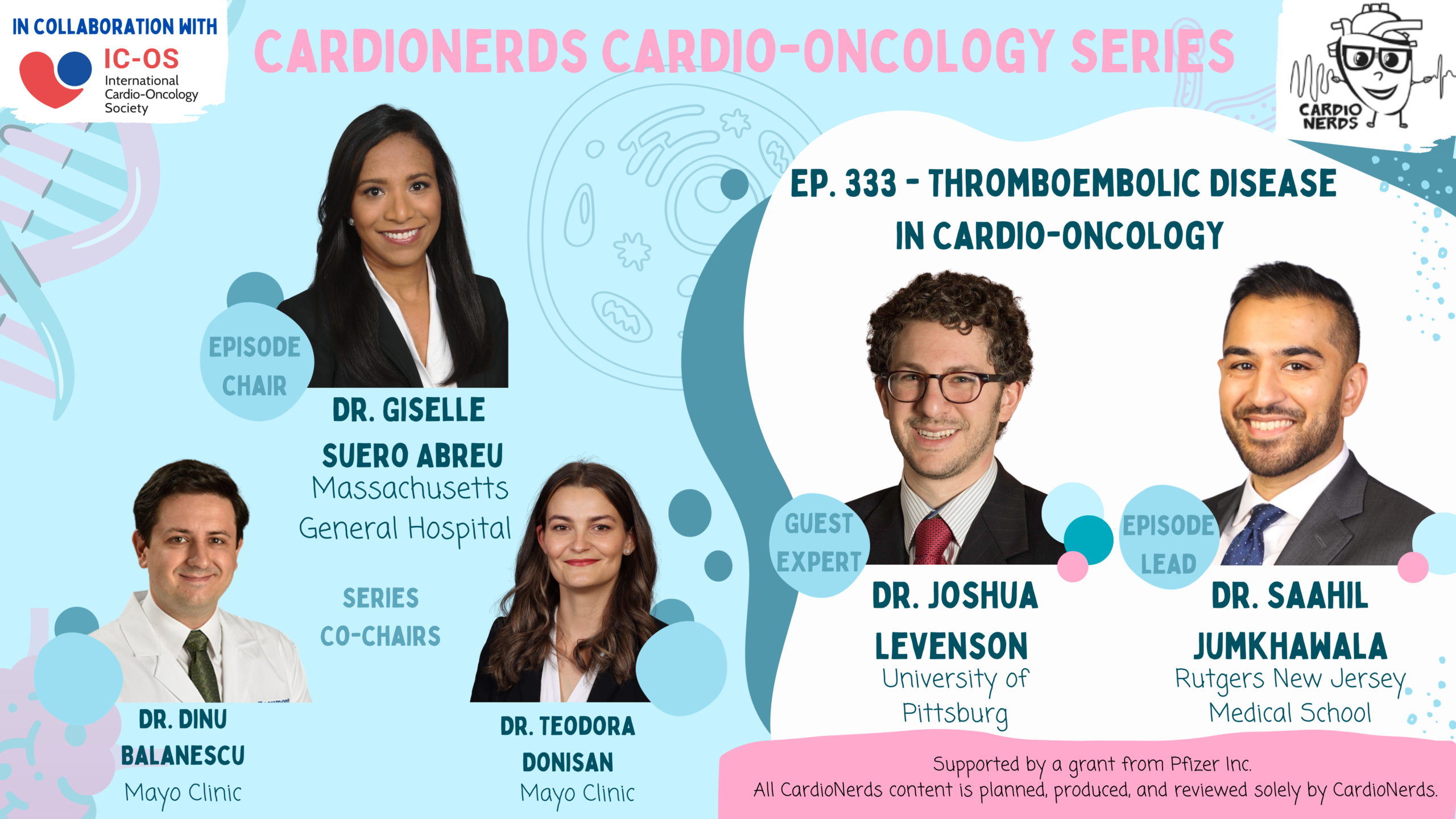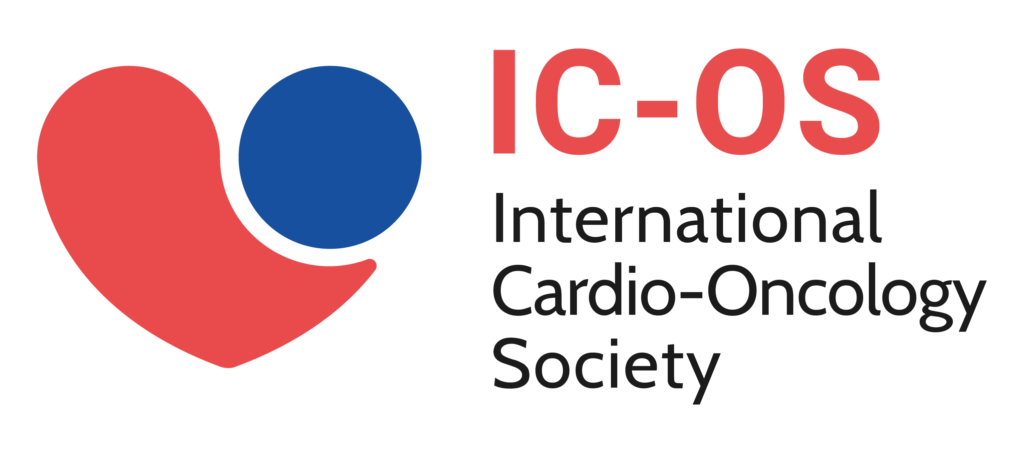
 Cardionerds: A Cardiology Podcast
Cardionerds: A Cardiology Podcast 333. Cardio-Oncology: Thromboembolic Disease in Cardio-oncology with Dr. Joshua Levenson
In this episode, CardioNerds Dr. Daniel Ambinder, Dr. Giselle Suero Abreu, and Dr. Saahil Jumkhawala discuss thromboembolic disease in cardio-oncology with faculty expert Dr. Joshua Levenson, the Associate Program Director of the cardiology fellowship and an Assistant Professor of Medicine at the University of Pittsburg School of Medicine. Venous (VTE) and arterial thromboembolic (ATE) events are precipitants of morbidity and mortality in patients with cancer. Here, we discuss the pathophysiology of thromboembolism, risk factors and epidemiology for ATE and VTE, the role of risk prediction and patient stratification, and the approach to treatment for and prophylaxis of thromboembolic events with anticoagulation. Show notes were drafted by Dr. Saahil Jumkhawala and episode audio was edited by CardioNerds Intern Dr. Tina Reddy.
This episode is supported by a grant from Pfizer Inc.
This CardioNerds Cardio-Oncology series is a multi-institutional collaboration made possible by contributions of stellar fellow leads and expert faculty from several programs, led by series co-chairs, Dr. Giselle Suero Abreu, Dr. Dinu Balanescu, and Dr. Teodora Donisan.
US Cardiology Review is now the official journal of CardioNerds! Submit your manuscript here.

Pearls and Quotes – Thromboembolic Disease in Cardio-oncology
- Patients with cancer are at higher risk of developing both arterial and venous thromboembolic events compared to the general population.
- Certain cancer subtypes are associated with a relatively higher risk of developing thromboembolic complications.
- Anticoagulation type and duration should be dependent on patient characteristics and risk factors, with shared decision-making between the patient and their providers.
- Subgroups of patients may benefit from more aggressive management of their atherosclerotic cardiovascular risk factors while being treated for cancer to reduce the risk of thromboembolic complications.
Show notes – Thromboembolic Disease in Cardio-oncology
What are the incidence and main manifestations of thromboembolic events (venous and arterial) in patients with active malignancy?
Approximately 10% of outpatients with active cancer have venous thromboembolic events, many of which are asymptomatic. Clinically relevant VTEs are predominantly deep venous thrombosis (DVTs) with pain and/or swelling of the involved extremities or pulmonary emboli (PEs) resulting in chest pain and/or shortness of breath. VTE is the number one preventable cause of death for all hospitalized patients, and the ability to prevent and treat these events is crucial, particularly in high-risk populations such as patients with cancer.
Are there any high-risk associations with specific cancer subtypes?
Patients with metastatic disease and those receiving chemotherapy are more likely to develop arterial or venous thromboembolic events. Patients with acute myelogenous leukemia (AML) and thrombocytopenic patients are at the lowest risk for thromboembolic events. Multiple myeloma patients on medication such as proteasome inhibitors or lenalidomide appear at particular risk. Patients with localized, early-stage cancers such as breast, prostate, and melanoma are also at lower risk.
What are the main risk factors to identify patients at a higher risk of developing thrombotic complications?
Patients with a sedentary lifestyle, deconditioning, and undergoing active treatment with chemotherapy are at the highest risk of developing DVT or PE.
How should we approach choosing the optimal type and duration of anticoagulation for acute pulmonary embolism (PE) in the setting of malignancy?
This remains an area of active research. Historically, patients would receive systemic anticoagulation with heparin followed by warfarin. Low molecular weight heparin (LMWH) has been found to be superior to warfarin in this patient population. In the recent trials comparing LMWH to direct oral anticoagulants (DOACs), particularly apixaban, edoxaban, and rivaroxaban, a similar incidence of VTEs and relatively equivalent bleeding events have been found. This has transitioned the field towards the higher use of DOACs, except for gastric cancers, in which DOACs have been found to have higher bleeding risk. Dabigatran has been found to be associated with a higher incidence of bleeding and gastrointestinal side effects compared to other DOACs. Important considerations for the use of DOACs are the patient’s renal function and the ability to take oral medications or issues with gastrointestinal absorption.
For acute PE, three months of treatment is the minimum for the standard of care. For patients with ongoing treatment with systemic chemotherapy or radiation, treatment for at least six months may be considered, or even indefinitely, if risk factors for recurrence persist. Shared decision-making with patients regarding the relevant risks and benefits of ongoing anticoagulation remains critical.
What are some risk assessment models to help identify patients at high risk for developing recurrent thrombotic events?
The Khorana score, which includes prechemotherapy platelet count ≥350 x109/L, elevated WBC >11 x109/L, low hemoglobin <10g/dL, or BMI ≥35 kg/m2 may help risk-stratify higher-risk patients. Certain types of cancers place patients at different risks; for example, gastric and pancreatic cancers confers higher risk, while patients with lung cancers, lymphoma, or genitourinary cancers confer a mildly elevated risk.
Patients with no risk factors have less than <1% risk of PE or DVT in the following 2.5 months, those with 1 or 2 points have about 2% risk of PE or DVT in the following 2.5 months, and those with >3 points have about 7% risk of PE or DVT in the following 2.5 months.
How does one manage recurrent thrombotic events, particularly while patients are already on an oral anticoagulant?
One major consideration in patients with recurrent thrombotic events is ensuring adherence, as there may be concerns with patient education, access, or cost which need to be addressed. Once compliance is confirmed, a patient can be switched from one DOAC to another DOAC or from one DOAC to LWMH, with the twice-daily dose having the strongest evidence for efficacy.
Rarely, concurrent treatment with antiplatelet therapy and LWMH may be considered in patients at very high risk for recurrent thrombotic events, particularly in patients with widely disseminated cancers with vascular complications. Notably, workup for underlying hypercoagulability should be considered in patients with localized malignancies with recurrent thromboembolic events.
What are considerations for scenarios with high bleeding risk when there is a strong indication for anticoagulation?
For patients with chemotherapy-induced thrombocytopenia, thromboelastography (“TEG” scan) may be valuable in guiding whether patients are hyper- or hypo-coagulable. Patients with platelet count <20K should generally not be on anticoagulation. For patients anticipated to have thrombocytopenia sustained through treatment, discussion with the treating oncology team may guide towards withholding ongoing anticoagulation. Mobility and sequential compression devices (SCDs) should be advised for patients to avoid the development of DVTs while patients are in the hospital. As platelet counts rise, consideration of subtherapeutic doses of heparin may be considered.
Any lesion with metastasis to the brain is at risk for bleeding. Discussion with oncology, neuro-oncology, and neurosurgery is crucial in identifying the risk of hemorrhage of these lesions. Primary brain tumors, such as glioblastoma, are associated with an elevated risk of DVT, likely attributable in part to reduced mobility and VEGF-targeted treatment.
Management of malignant pericardial effusions varies by etiology. Patients with local malignant pericardial effusion may be managed with pericardiocentesis with catheter drainage versus pericardial window, depending on clinician availability and expertise.
What is the role of inferior vena cava (IVC) filters in the management of patients at high risk for developing thromboembolic events?
For patients with active DVT and PE burden with active or very high risk for bleeding, it may be considered to place a retrievable IVC filter with the goal of removal within 4-6 weeks, and anticoagulation restarted as soon as possible. Of note, IVC filters that remain in place for longer periods of time place the risk of the development of thrombi and distal embolization.
How does the management of arterial thrombotic events for patients with active malignancy differ from the treatment of venous thromboembolic disease?
Arterial thrombotic events may be sequelae of atherosclerotic cardiovascular disease, dysfunction of the coagulation cascade, or both. Patients with atherosclerotic cardiovascular disease are at higher risk for developing cardiovascular events when treated for cancer. Certain patients, such as men with prostate cancer, appear to be at higher risk related to hormonal derangements during treatment. Proactive management of atherosclerotic risk factors in these patients is imperative with modalities such as coronary computed tomography (CT) scans to identify the burden of atherosclerotic coronary disease with coronary calcium scoring. These patients may benefit from more aggressive treatment with statin therapy and antiplatelet therapy. Patients with preexisting coronary disease being treated with endocrine therapies or VEGF tyrosine kinase inhibitors (TKIs) may be at higher risk for atherosclerotic cardiovascular events during treatment and, therefore indicated for more aggressive lifestyle and risk factor modification.
References – Thromboembolic Disease in Cardio-oncology
- Lyon, A. R., López-Fernández, T., Couch, L. S., Asteggiano, R., Aznar, M. C., Bergler-Klein, J., … & Zamorano, J. L. (2022). 2022 ESC Guidelines on cardio-oncology developed in collaboration with the European Hematology Association (EHA), the European Society for Therapeutic Radiology and Oncology (ESTRO) and the International Cardio-Oncology Society (IC-OS) Developed by the task force on cardio-oncology of the European Society of Cardiology (ESC). European heart journal, 43(41), 4229-4361.
- Gervaso, L., Dave, H., & Khorana, A. A. (2021). Venous and arterial thromboembolism in patients with cancer: JACC: CardioOncology state-of-the-art review. JACC: CardioOncology, 3(2), 173-190.
- Streiff, M. B., Abutalib, S. A., Farge, D., Murphy, M., Connors, J. M., & Piazza, G. (2021). Update on guidelines for the management of cancer‐associated thrombosis. The Oncologist, 26(1), e24-e40.
- O’Connell, C., Escalante, C. P., Goldhaber, S. Z., McBane, R., Connors, J. M., & Raskob, G. E. (2021). Treatment of Cancer‐Associated Venous Thromboembolism with Low‐Molecular‐Weight Heparin or Direct Oral Anticoagulants: Patient Selection, Controversies, and Caveats. The Oncologist, 26(1), e8-e16.
- Agnelli, G. (2019). Direct oral anticoagulants for thromboprophylaxis in ambulatory patients with cancer. N Engl J Med, 380(8), 781-783.
Meet Our Collaborators
International Cardio-Oncology Society ( IC-OS). IC-OS exits to advance cardiovascular care of cancer patients and survivors by promoting collaboration among researchers, educators and clinicians around the world. Learn more at https://ic-os.org/.

